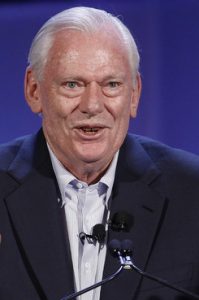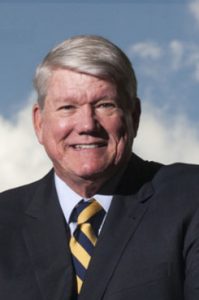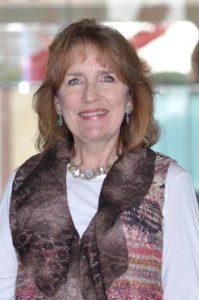The Southwest Effect: How the Airline Changed the Legal Landscape in Texas
Herb Kelleher, the co-founder and longtime chief executive of Southwest Airlines who died in January at the age of 87, almost certainly didn't set out to change the legal landscape in Texas. It was the untapped potential in the Texas skies he was after.
March 11, 2019 at 06:00 PM
7 minute read

If you want to identify one of the most influential lawyers in Texas history, the roster to choose from would likely—and rightly—include some pretty incredible legal titans that run the gamut from Big Law firm founders to plaintiff lawyers with a litany of eye-popping verdicts to trailblazers who achieved what no one before them had been capable of accomplishing.
But how do you qualify influence? In seeking the answer to that question, it might be necessary to step back and survey the landscape from a better vantage point—say, one with a 30,000-feet view. It's there that you might find a case to be made for a New Jersey-born lawyer whose lifespan as a law firm partner in Texas lasted only a few short few years at the now-defunct Matthews, Nowlin, Macfarlane & Barrett in San Antonio, and whose Texas bar license lapsed in 1996. In fact, his legal experience might appear as a mere biographical footnote in a broader examination of the legacy he leaves as a businessman.
 Herb Kelleher.
Herb Kelleher.Herb Kelleher, the co-founder and longtime chief executive of Southwest Airlines who died in January at the age of 87, almost certainly didn't set out to change the legal landscape in Texas. It was the untapped potential in the Texas skies he was after.
Nonetheless, impact the Texas legal landscape he did.
In a July 3, 1995, story in Texas Lawyer, “A Tale of Two Cities,” firm leaders directly attributed the viability of their office expansions in Dallas and Houston to Southwest Airlines, which began operating flights in Texas after Kelleher won a court case allowing it in 1971. From the story:
With few exceptions, it seems the offices were opened less because of a particular client's needs than because a presence at both ends of I-45 is considered a minimum requirement for firms that want to be considered statewide or regional players. Easing the logistics was Southwest Airlines, whose frequent, cheap flights to and from both cities made the commute less daunting.
Southwest Airlines took the hassle out of traveling between these Texas cities, which count hundreds of miles between them. Dallas to Houston is 240 miles, which is nearly the same distance as Washington D.C. is to New York City. With Southwest, commutes to just about any city in Texas could be made in a fraction of the time.
“Southwest Airlines made it work,” said Baker Botts managing partner E. William Barnett in 1995. Barnett expounded on those comments in a recent interview.
“So much of the work we do in Dallas we wouldn't be doing without an office there,” said Barnett, who served as general manager of Baker Botts from 1984 to 1998. The firm opened its Dallas office in 1985 with eight lawyers.
Some of that early work included representing Electronic Data Systems, a Dallas company started by business magnate and former presidential candidate Ross Perot in 1962. And when Baker Botts set out to start an intellectual property practice, its initial hires were in Dallas, Barnett said. The IP practice alone now boasts 150 lawyers. All told, Baker Botts today has 742 lawyers working in more than a dozen offices around the world, with 371 based in Texas.
Harry Reasoner, a firm leader at Houston-based Vinson & Elkins echoed those sentiments regarding its own office expansions. “The ease of travel certainly facilitated our development of our offices in Dallas and Austin,” said Reasoner, a partner who joined the firm in 1964 and served as its managing partner from 1992 to 2001.
But the biggest impact that Southwest had on V&E was as a client.
“We were known as the law firm that represented Southwest,” Reasoner said.
 Charles “Chip” Babcock
Charles “Chip” BabcockAnd no conversation of outsized Texas lawyers would be complete without mentioning Charles “Chip” Babcock, a Jackson Walker litigator with a reputation for winning with an emphasis on media and First Amendment cases that—in the early days—would take him all throughout Texas.
Babcock recalled representing a newspaper reporter who was covering the trial of Fort Worth millionaire T. Cullen Davis on a murder-for-hire charge in Houston in the late 1970s. Davis was accused of hiring a hit-man to murder his estranged wife, Priscilla Davis, and the judge overseeing their divorce. The Dallas Times Herald called him, Babcock said, because its reporter had been subpoenaed to testify at the trial, which would preclude her from being in the courtroom to cover the trial.
“I whipped up a motion to quash (the subpoena) and got on Southwest out of Dallas,” Babcock said. “I couldn't have gotten to the hearing except for Southwest Airlines.”
Davis was acquitted of the solicitation of murder charge in November 1979.
In terms of a more regular commute, Babcock said the firm asked him to help with the merger of cultures between Jackson Walker and Dotson Scofield in 1990. When Babcock moved back to Dallas in 1993, he had a management position in Houston that required frequent trips there. “I had both Dallas and Houston cases,” he said. “Frankly, I couldn't have done it without Southwest Airlines.”
 Debby Ackerman, former Southwest general counsel.
Debby Ackerman, former Southwest general counsel.Kelleher himself commuted back and forth between Dallas, where Southwest is headquartered, and San Antonio, where his family was located. It actually wasn't uncommon for members of the company's legal team to commute between those two cities, said Debby Ackerman. Ackerman started working at Southwest in 1988 and was promoted as the airline's first female general counsel in 2001.
“Every morning they'd get up and take the 7 am flight from San Antonio to Dallas, practice all day, and then turn around and take the 6 or 7 pm flight back home again,” she said.
And in those early days as the airline attempted to keep costs low, lawyers weren't exactly sticking around for the great pay, but for a culture that valued people.
“[Herb] valued lawyers; valued their contributions; was eager to hear from them on a variety of topics,” she said. “It was just a very good place to be a lawyer. Because you were really part of the whole team. And I know that's not the case in every company who has lawyers and certainly not the case in every airline that has lawyers. So I felt very fortunate to work for them.”
Kelleher himself was a meticulous lawyer who would read all the company's SEC filings, proxy statements and 10-K reports.
“I got to where I would leave a red-herring in there just so he could catch something,” she said. “And he would go 'aha!' and he would take such glee in finding something wrong with it.”
Working for a boss with such high standards wasn't off-putting for Ackerman. She said that she really was never all that proud to be a lawyer until she started working for Southwest Airlines.
“I think the team idea that we all work at the same place and all have the same ultimate goal works any place, that was from Herb's great genius,” she said.
Those principles flowed from a man who didn't grow up in an elitist environment. You don't have to look much further than the lack of first-class seats on Southwest's planes to understand his egalitarian nature, which seeped into all aspects of company culture.
“It's funny the thing about Southwest Airlines, you ask anybody—ask a flight attendant, a reservation agent, whoever it is—what is the most important job in the company? 'Oh mine, I have the most important job in the company',” she said. “I mean everybody was convinced, honestly, that they had the most important job in the company. And [Herb] made them all feel that way!”
This content has been archived. It is available through our partners, LexisNexis® and Bloomberg Law.
To view this content, please continue to their sites.
Not a Lexis Subscriber?
Subscribe Now
Not a Bloomberg Law Subscriber?
Subscribe Now
NOT FOR REPRINT
© 2025 ALM Global, LLC, All Rights Reserved. Request academic re-use from www.copyright.com. All other uses, submit a request to [email protected]. For more information visit Asset & Logo Licensing.
You Might Like
View All
Sunbelt Law Firms Experienced More Moderate Growth Last Year, Alongside Some Job Cuts and Less Merger Interest
4 minute read
Once the LA Fires Are Extinguished, Expect the Litigation to Unfold for Years
5 minute read

Trending Stories
- 1New York-Based Skadden Team Joins White & Case Group in Mexico City for Citigroup Demerger
- 2No Two Wildfires Alike: Lawyers Take Different Legal Strategies in California
- 3Poop-Themed Dog Toy OK as Parody, but Still Tarnished Jack Daniel’s Brand, Court Says
- 4Meet the New President of NY's Association of Trial Court Jurists
- 5Lawyers' Phones Are Ringing: What Should Employers Do If ICE Raids Their Business?
Who Got The Work
J. Brugh Lower of Gibbons has entered an appearance for industrial equipment supplier Devco Corporation in a pending trademark infringement lawsuit. The suit, accusing the defendant of selling knock-off Graco products, was filed Dec. 18 in New Jersey District Court by Rivkin Radler on behalf of Graco Inc. and Graco Minnesota. The case, assigned to U.S. District Judge Zahid N. Quraishi, is 3:24-cv-11294, Graco Inc. et al v. Devco Corporation.
Who Got The Work
Rebecca Maller-Stein and Kent A. Yalowitz of Arnold & Porter Kaye Scholer have entered their appearances for Hanaco Venture Capital and its executives, Lior Prosor and David Frankel, in a pending securities lawsuit. The action, filed on Dec. 24 in New York Southern District Court by Zell, Aron & Co. on behalf of Goldeneye Advisors, accuses the defendants of negligently and fraudulently managing the plaintiff's $1 million investment. The case, assigned to U.S. District Judge Vernon S. Broderick, is 1:24-cv-09918, Goldeneye Advisors, LLC v. Hanaco Venture Capital, Ltd. et al.
Who Got The Work
Attorneys from A&O Shearman has stepped in as defense counsel for Toronto-Dominion Bank and other defendants in a pending securities class action. The suit, filed Dec. 11 in New York Southern District Court by Bleichmar Fonti & Auld, accuses the defendants of concealing the bank's 'pervasive' deficiencies in regards to its compliance with the Bank Secrecy Act and the quality of its anti-money laundering controls. The case, assigned to U.S. District Judge Arun Subramanian, is 1:24-cv-09445, Gonzalez v. The Toronto-Dominion Bank et al.
Who Got The Work
Crown Castle International, a Pennsylvania company providing shared communications infrastructure, has turned to Luke D. Wolf of Gordon Rees Scully Mansukhani to fend off a pending breach-of-contract lawsuit. The court action, filed Nov. 25 in Michigan Eastern District Court by Hooper Hathaway PC on behalf of The Town Residences LLC, accuses Crown Castle of failing to transfer approximately $30,000 in utility payments from T-Mobile in breach of a roof-top lease and assignment agreement. The case, assigned to U.S. District Judge Susan K. Declercq, is 2:24-cv-13131, The Town Residences LLC v. T-Mobile US, Inc. et al.
Who Got The Work
Wilfred P. Coronato and Daniel M. Schwartz of McCarter & English have stepped in as defense counsel to Electrolux Home Products Inc. in a pending product liability lawsuit. The court action, filed Nov. 26 in New York Eastern District Court by Poulos Lopiccolo PC and Nagel Rice LLP on behalf of David Stern, alleges that the defendant's refrigerators’ drawers and shelving repeatedly break and fall apart within months after purchase. The case, assigned to U.S. District Judge Joan M. Azrack, is 2:24-cv-08204, Stern v. Electrolux Home Products, Inc.
Featured Firms
Law Offices of Gary Martin Hays & Associates, P.C.
(470) 294-1674
Law Offices of Mark E. Salomone
(857) 444-6468
Smith & Hassler
(713) 739-1250






